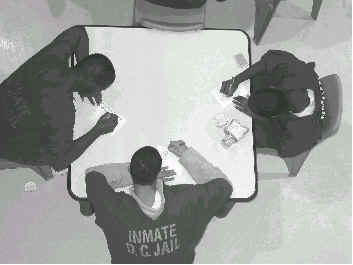ArtCARE:
Outreach
to Juveniles in Adult Jails
|
| Background
- Juveniles in Adult Jails |
 The juvenile justice system as
developed over 100 years ago, was based upon the social fact that children are not fully
developed moral beings and should not be treated like adults. That philosophy holds
children accountable for their offenses, but does not treat them as adult criminals, but
rather balances consequences and punishment with rehabilitation and redemption. The juvenile justice system as
developed over 100 years ago, was based upon the social fact that children are not fully
developed moral beings and should not be treated like adults. That philosophy holds
children accountable for their offenses, but does not treat them as adult criminals, but
rather balances consequences and punishment with rehabilitation and redemption. On the other hand, the underlying premise
of the direct file is that children are mini-adults and become mini-adults by
virtue of their bad acts. The power of the prosecutor to direct file a child 14 or older
for most felonies comes from a law that authorizes them to make unilateral decisions about
transferring juvenile cases to adult court. That decision requires no explanation and
cannot be reviewed by a judge or a higher court. Once direct filed, many transferred
youths in Miami-Dade County spend months in the TGK facility awaiting resolution of their
cases. These are the youths that participated in the ArtCARE project.
Scientific research indicates that juveniles of similar age, prior record and criminal
charges who were given appropriate juvenile penalties re-offended less often than those
who were sent to adult court and given adult penalties. See A DJJ Success Story, Trends
in Transfer of Juveniles to Adult Criminal Court, Florida Department of Juvenile
Justice, January 2002, http://www.djj.state.fl.us/special/transfersummary.pdf. It
is believed that juvenile programs, such as Bay Point, a long-term juvenile commitment
program, have significantly better records of reducing crime among young offenders. Those
juvenile programs are successful because they offer support, education, guidance and
aftercare services as the youngsters enter adulthood. In spite of this research, in fiscal
year 1999-2000 Florida transferred over 3,000 juveniles to adult court. |
|
Become Informed
ABA Juvenile Justice Center
740 15th street, NW 9th floor
Washington, DC 20005
http://www.abanet.org/crimjust/juvjus/
Youth Law Center
Children's Legal Protection Center
1010 Vermont Avenue, N.W., Suite 310
Washington, DC 20005-4902
http://www.youthlawcenter.com
The Sentencing Project, Inc.
514 - 10th Street NW, Suite 1000
Washington, DC 20004
http://www.sentencingproject.org
|
|